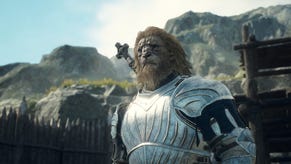Takedown dev explains why publishers aren't interested in "real tactical shooters"
Christian Allen on the "Kickstarter Spring" and his duty of responsibility to backers.
Major publishers view traditional tactical shooters in the vein of the original Rainbow Six as a niche sub-genre that holds little potential for attracting new customers, so says Christian Allen, the former Halo Reach design lead who took to Kickstarter last month to get his pet project Takedown off the ground.
Allen told Eurogamer that he'd been pitching the idea of a proper tactical shooter for years, both while working as an internal developer and as an indie, before finally giving up and turning to the zeitgeist-chasing crowdfunding site.
"I spoke to several [publishers] recently, pitching this game in several different IPs," he explained.
"But of course this is something that I have been pitching as an internal dev for years, and have pretty much gotten the same lukewarm responses every time.
"And I understand why - the big publishers have big budgets and they want a return on that budget, so they want a game that is measurable against others on the mainstream market today."
According to Allen, in the age of twitchy shooters like Modern Warfare and Battlefield 3, mainstream publishers view the audience for his chosen genre as just too small to bother with.
"The big publishers view real tac shooters as too niche. Hell, even some of the critiques of this project were saying that we were going too niche to get support," he said.
"I did get responses that some might be interested if we went with a freemium model, much like AOE and MS Flight Sim have recently done, but I was really hesitant to do that because of the effect on gameplay those systems have.
"The key is that they want to 'broaden' their audience, and going more of an old school route is seen as limiting the potential audience to a small niche of very vocal fans."
Naturally, Allen believes they're wrong. Providing you go in with realistic expectations and a budget to match, there are more than enough people out their pining for a slower, more deliberate take on the FPS genre.
"I don't doubt that they are working with a correct assumption, but the key is the numbers we are talking about, the scale of that audience. We are not looking to sell five million-plus in order to be profitable, we are talking about a smaller scale. And I do think that is a viable market.
"Will it sell 27 million units and rush to the top of the charts? No I don't think it will. But based on the response we have gotten, I do think this is a viable market for a game with a proper budget and scope."
As remarked upon by a number of commentators, Allen's Kickstarter offering differs from trailblazers like Double Fine Adventure and Wasteland 2 in that he wasn't trying to raise the game's entire budget. Instead he just wanted enough for his studio, Serellan, to get the concept to alpha so he could seeker further investment to bring it to completion.
But what if he doesn't succeed and the game is never completed? Isn't that a huge burden of responsibility to the faithful backers who've pledged their cash?
"It is a huge responsibility, and that is why we have been upfront about it from day one, so that people could judge for themselves," he replied, before revealing that the publicity gained has already opened up some interesting doors for his team.
"The good news is that the exposure for the project has actually opened up more options than we had in the beginning, so it is less about 'if' we will sign additional investors, but who who we will be working with that understands the goals of the project and the need to deliver a true experience to the fans that supported this games.
"Every project has risks, but you work to mitigate those risks to deliver the best possible experience to the player, and we are very focused on the scope and goals of the game. We aren't trying to shoot the moon here, but to make a solid, fun, tactical title."
Elsewhere in the interview, Allen also touched on what the burgeoning Kickstarter trend could mean for the games industry at large. While it's unlikely to kill off the publisher wholesale, he argued, it will result in crowd-pleasing titles making it onto shelves that would never otherwise have been green-lit.
"I hope they are the tip of the iceberg," he said, referring to Double Fine Adventure, Wasteland 2 and Takedown.
"Someone that emailed me the other day called it the 'Kickstarter Spring'. I think there are opportunities for games that would never have seen the light of day come to fruition."
"As far as the publishers being worried, I wouldn't go that far. Licenses and IPs are huge, and as we've seen with Double Fine Adventure, Wasteland 2, and Takedown, these are more 'retro' titles that want to bring back an experience that people have missed, so they aren't even directly competing with the big mainstream games.
"Even if Kickstarter turns into the Sundance of game development, there are still people out there that want to buy mainstream titles. I don't think we will suddenly see a 'Madden killer' suddenly Kickstarted."
The Kickstarter bandwagon shows no sign of slowing down. Two more projects have gone live in the past few days alone - a remake of lewd Sierra adventure game Leisure Suit Larry and a sequel to '90s RPG Shadowrun - and both are racing towards their funding goals.











